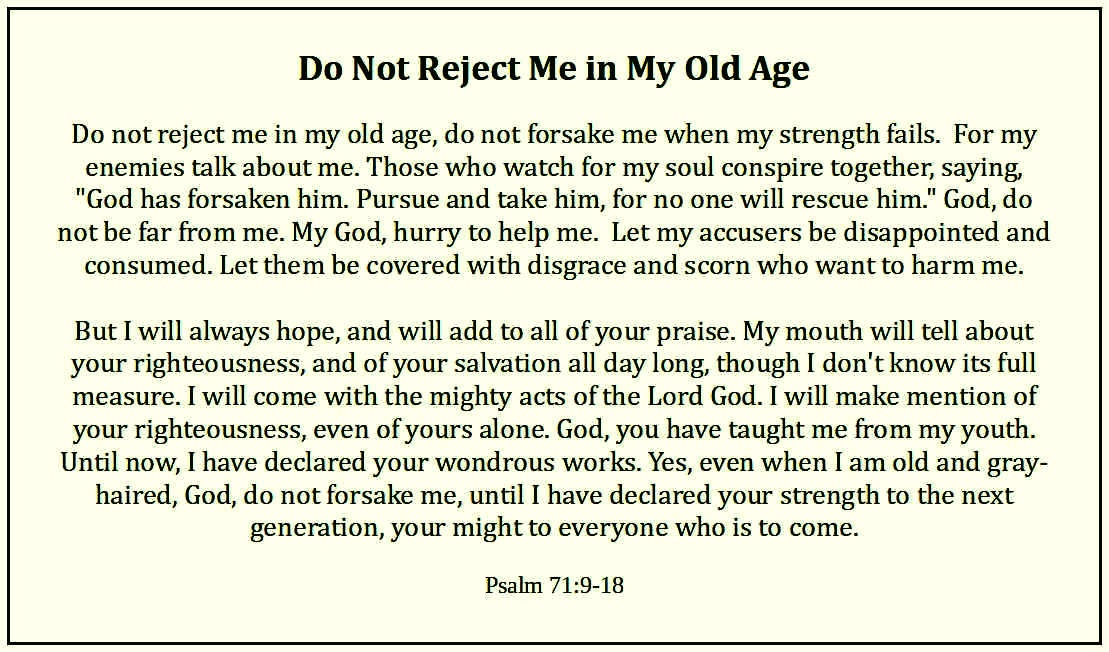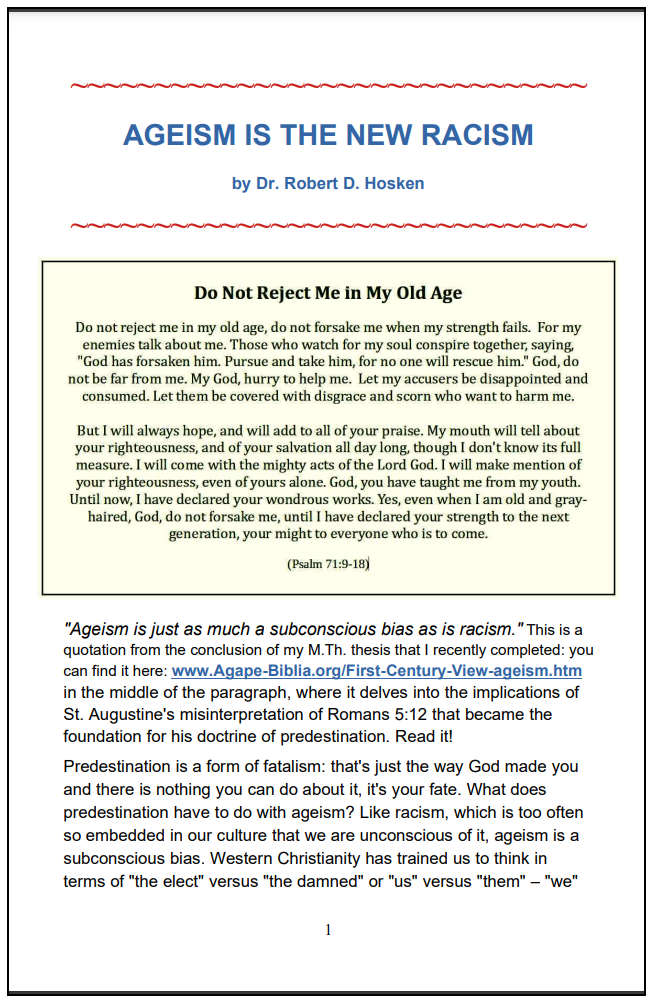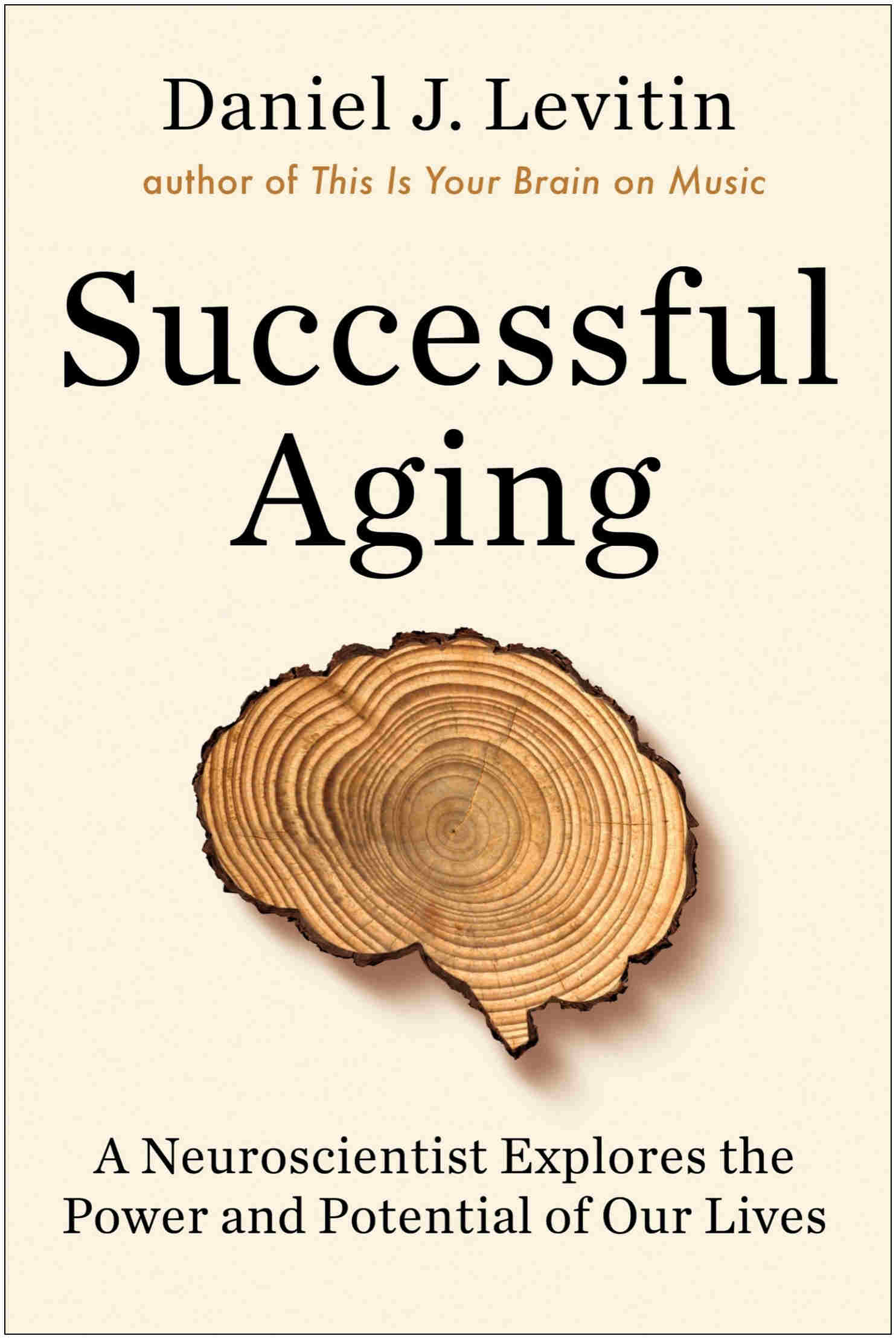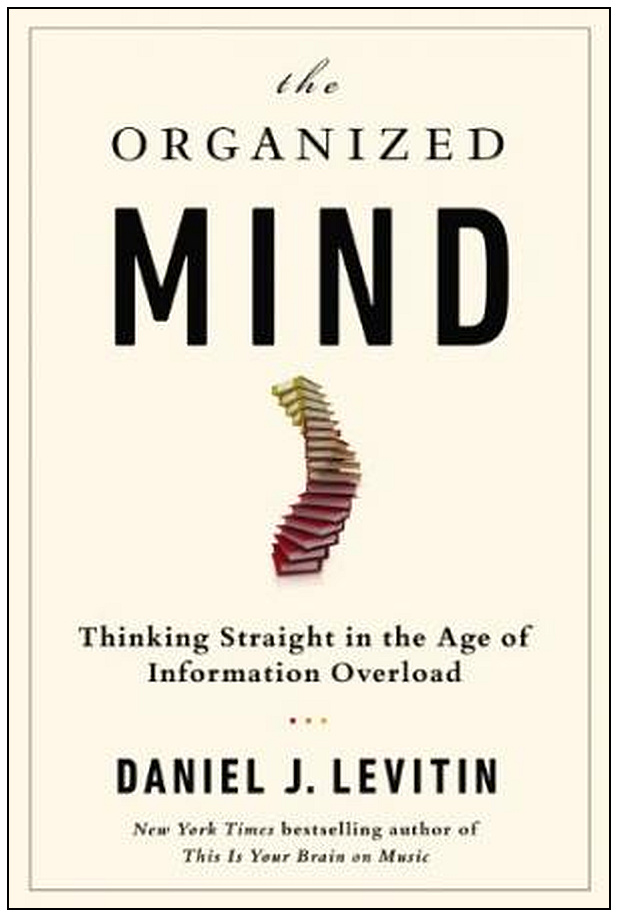DO NOT REJECT ME IN MY OLD AGE
 This picture (click it) was in my blog & newsletter article "Ageism Is The New Racism" (7 May 2022 ARC-News). It focused on the unconscious confirmation bias toward elderly people which is coming to the fore now that racial bias is receding. It's become "cool" to be anti-racist these days, but ageism is still alive and well... and increasing. Why is it that even people who rail against racism and think they aren't prejudiced in any way can harbor the unconscious confirmation bias of ageism?
This picture (click it) was in my blog & newsletter article "Ageism Is The New Racism" (7 May 2022 ARC-News). It focused on the unconscious confirmation bias toward elderly people which is coming to the fore now that racial bias is receding. It's become "cool" to be anti-racist these days, but ageism is still alive and well... and increasing. Why is it that even people who rail against racism and think they aren't prejudiced in any way can harbor the unconscious confirmation bias of ageism?
 Get "Ageism Is the New Racism" also as a PDF, a 5.5" x 8.5"-formatted 4-page booklet. Ageism, like racism, is an often-subconscious bias that is reflected in the way many people relate to elderly people, either by "politely" ignoring them or by assuming that elderly people (especially with a disability such as hearing loss) have "dementia" – Parkinson's or Alzheimer's Disease – and are incapable of interacting, thus treating them as "other" or less than human. This brief article is based on the Conclusion in this webmaster's online M.Th.S. thesis A First-Century View of Yeshua, the Messiah – you can read it online or download and print this thesis by clicking here.
Get "Ageism Is the New Racism" also as a PDF, a 5.5" x 8.5"-formatted 4-page booklet. Ageism, like racism, is an often-subconscious bias that is reflected in the way many people relate to elderly people, either by "politely" ignoring them or by assuming that elderly people (especially with a disability such as hearing loss) have "dementia" – Parkinson's or Alzheimer's Disease – and are incapable of interacting, thus treating them as "other" or less than human. This brief article is based on the Conclusion in this webmaster's online M.Th.S. thesis A First-Century View of Yeshua, the Messiah – you can read it online or download and print this thesis by clicking here.
All people understand new things on the basis of what they have previously learned. We learn how to speak by hearing certain sounds over and over again in various contexts. After we've learned how to speak, read and write our native language, we don't consciously think about making the right sounds or connecting the sounds with written letters: it has become an unconscious process. It's the same with ageism: when a child first sees older people and asks mama or daddy why they look or act differently, the parents explain that as people get older they slow down physically and/or mentally, their bodies get worn out or sick, and eventually they die.
So later, when that child sees an older person, he might assume that the person is starting to slow down physically and/or mentally, the person will get worn out or sick, and then die. How often have you heard derogatory terms such as "old geezer" or "crabby old lady"? We've finally learned not to use the "n-word" but we feel perfectly comfortable thinking and using such derogatory expressions about the elderly. And when an older person shows one of those behaviors, it may unconsciously confirm the idea – the bias – that this person is also going to become demented, get sick, and die pretty soon. By projecting those thoughts toward an older person through body language and tone of voice, without even saying a word, that person gets the idea that he/she ought to drop dead pretty soon.
We have collected a whole series of books along with the article "Ageism Is The New Racism" on our "Free Literature" page:
The following four books illustrate modern, secularized views on ageing that have arisen from Biblical teachings on respect shown to the elderly... teachings that today's Christians often sadly ignore.  Get Ending Ageism, or How Not to Shoot Old People by Margaret Morganroth Gullette (free PDF or Amazon). When the term "ageism" was coined in 1969, many problems of exclusion seemed resolved by government programs like Social Security and Medicare. As people are living longer, today's great demotions of older people cut deeper into their self-worth and human relations, beyond the reach of law or public policy.
Get Ending Ageism, or How Not to Shoot Old People by Margaret Morganroth Gullette (free PDF or Amazon). When the term "ageism" was coined in 1969, many problems of exclusion seemed resolved by government programs like Social Security and Medicare. As people are living longer, today's great demotions of older people cut deeper into their self-worth and human relations, beyond the reach of law or public policy.
In Ending Ageism, or How Not to Shoot Old People, award-winning writer and cultural critic Margaret Gullette confronts the offenders: the ways people aging past midlife are portrayed in the media or by adult offspring; the esthetics and politics of representation in photography, film, and theater; and the incitement to commit suicide for those with early signs of "dementia."
 Get Ageism Unmasked - Exploring Age Bias and How to End It by Tracey Gendron, Ph.D. (free EPUB – see note 1, or Amazon). Why do we still tolerate stereotypes and discrimination based on age? This bold account of the history and present-day realities of ageism by Dr. Gendron, a nationally recognized gerontologist and speaker, uncovers ageism's roots, impact, and how each of us can create a new reality of elderhood.
Get Ageism Unmasked - Exploring Age Bias and How to End It by Tracey Gendron, Ph.D. (free EPUB – see note 1, or Amazon). Why do we still tolerate stereotypes and discrimination based on age? This bold account of the history and present-day realities of ageism by Dr. Gendron, a nationally recognized gerontologist and speaker, uncovers ageism's roots, impact, and how each of us can create a new reality of elderhood.
Ageism Unmasked shifts the lens, enabling us to see that we tolerate, and sometimes actively promote, attitudes and behaviors toward differently aged people that we would reject and condemn if applied to any other group. It peels back the layers to expose how cultural norms and unconscious prejudices have seeped into our lives, silently shaping our treatment of others based on their age and our own misconceptions about aging – and about ourselves. Offering an all-inclusive approach, Dr. Tracey Gendron reveals the biases behind our false understanding of aging, sharing powerful opportunities for personal growth along with strategies to help create an anti-ageist society.
 Get Successful Aging: A Neuroscientist Explores the Power and Potential of Our Lives by Daniel J. Levitin, Ph.D. (free EPUB or Amazon). Author of the iconic bestsellers This Is Your Brain on Music and The Organized Mind, Daniel Levitin turns his keen insights to what happens in our brains as we age; why we should think about health span, not life span; and, based on a rigorous analysis of neuroscientific evidence, what you can do to make the most of your seventies, eighties, and nineties today, no matter how old you are.
Get Successful Aging: A Neuroscientist Explores the Power and Potential of Our Lives by Daniel J. Levitin, Ph.D. (free EPUB or Amazon). Author of the iconic bestsellers This Is Your Brain on Music and The Organized Mind, Daniel Levitin turns his keen insights to what happens in our brains as we age; why we should think about health span, not life span; and, based on a rigorous analysis of neuroscientific evidence, what you can do to make the most of your seventies, eighties, and nineties today, no matter how old you are.
Successful Aging (or "Ageing" in British English) uses research from developmental neuroscience and individual differences in psychology to show that sixty-plus years is a unique developmental stage that, like infancy or adolescence, has its own demands and distinct advantages. Levitin takes a scientific approach to what we all can learn from those who age joyously, as well as how to adapt our culture to take full advantage of older people's wisdom and experience.
 Get The Organized Mind: Thinking Straight in the Age of Information Overload by Daniel J. Levitin, Ph.D. (free EPUB or Amazon). Levitin runs the "Laboratory for Musical Perception, Cognition and Expertise" at McGill University, where he holds the Bell Chair in the Psychology of Electronic Communication. Before becoming a neuroscientist, he worked as a session musician, sound engineer and record producer. A New York Times bestselling author and neuroscientist, he shifts his keen insights from your brain on music to your brain in a sea of details. The information age is drowning us with an unprecedented deluge of data. At the same time, we're expected to make more – and faster – decisions about our lives than ever before. This book is an excellent resource for elderly people.
Get The Organized Mind: Thinking Straight in the Age of Information Overload by Daniel J. Levitin, Ph.D. (free EPUB or Amazon). Levitin runs the "Laboratory for Musical Perception, Cognition and Expertise" at McGill University, where he holds the Bell Chair in the Psychology of Electronic Communication. Before becoming a neuroscientist, he worked as a session musician, sound engineer and record producer. A New York Times bestselling author and neuroscientist, he shifts his keen insights from your brain on music to your brain in a sea of details. The information age is drowning us with an unprecedented deluge of data. At the same time, we're expected to make more – and faster – decisions about our lives than ever before. This book is an excellent resource for elderly people.
No wonder, then, that the average American (especially an older person) reports frequently losing car keys or reading glasses, missing appointments, and feeling worn out by the effort required just to keep up. But somehow some people become quite accomplished at managing information flow. In The Organized Mind, Daniel Levitin uses the latest brain science to demonstrate how those people excel – and how readers can use their methods to regain a sense of mastery over the way they organize their homes, workplaces, and time. With lively, entertaining chapters on everything from the kitchen junk drawer to health care to executive office workflow, Levitin reveals how new research into the cognitive neuroscience of attention and memory can be applied to the challenges of our daily lives. His earlier book This Is Your Brain on Music showed how to better play and appreciate music through an understanding of how the brain works. The Organized Mind shows how to navigate the churning flood of information in the twenty-first century with the same neuroscientific perspective.
Go to ARC-News to read our free e-newsletters and Subscribe!

No comments:
Post a Comment